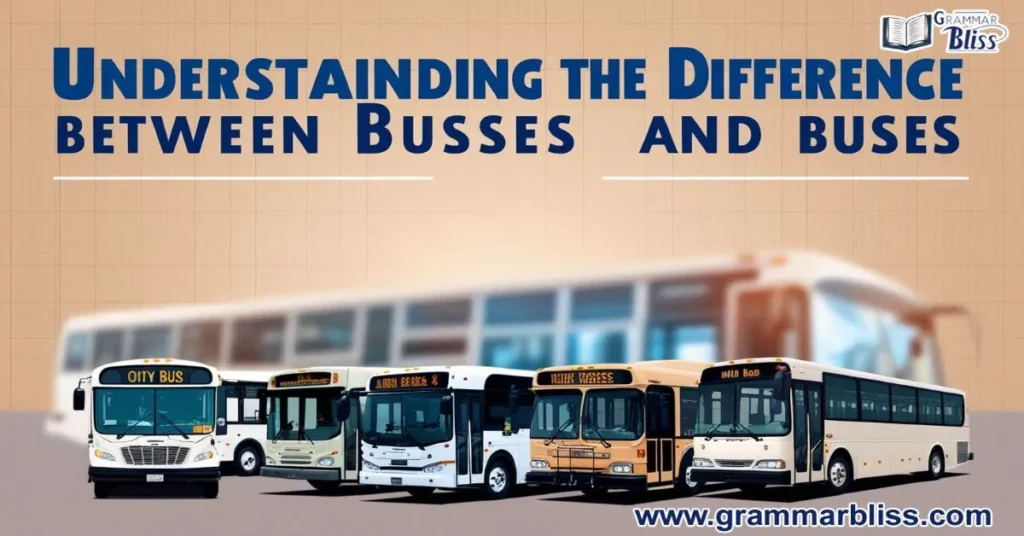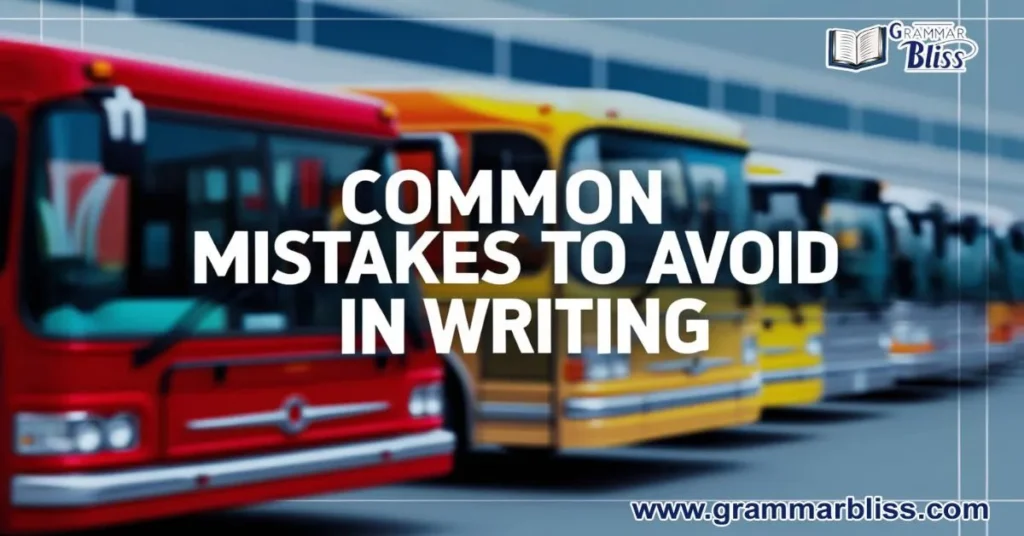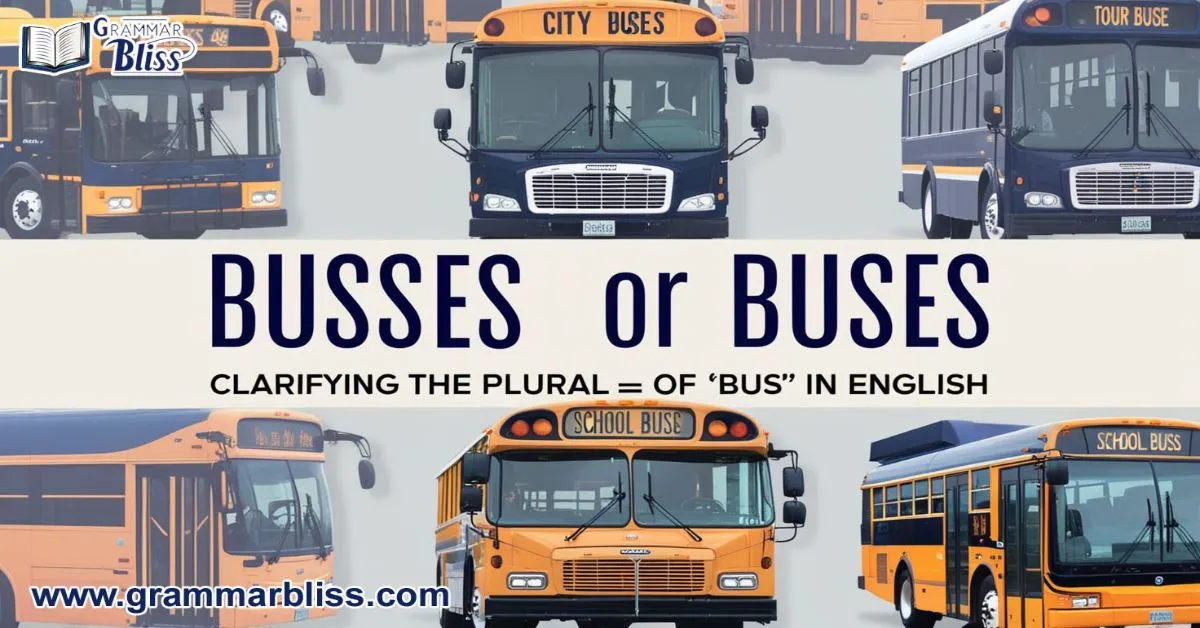In English, understanding the correct use of busses or buses can be tricky for many writers. While both words sound the same, they have different meanings and spellings. The term buses is the correct plural form of bus, used to describe multiple vehicles that transport passengers, especially in public transport or school transportation contexts.
On the other hand, busses is an older, less common word that refers to kisses, primarily in romantic contexts or poetic expressions. This confusion can lead to grammar mistakes and misspelled words in writing, affecting content clarity and even SEO performance in content writing and online content.
Quick Summary
Here we explore the difference between buses and busses in English. Buses is the correct plural form of bus, referring to multiple transportation vehicles. On the other hand, busses is an outdated term, primarily used to mean kisses or actions related to the verb buss. Understanding this distinction is crucial to avoid grammar mistakes and ensure clarity in writing. The guide also highlights the impact of using the correct term on SEO performance and content clarity in content writing and public transit contexts.
Read: invision-or-envision-which-is-correct-a-complete-guide/
Understanding the Difference Between Busses and Buses

When it comes to the words busses and buses, many people often get confused about which one to use. These two terms are related to the same concept of vehicles but are used in different contexts. Buses is the correct and modern plural form of bus, used when referring to multiple transportation vehicles that carry passengers. On the other hand, busses is a less common form, and it is used mainly as the plural of buss, which is an old-fashioned word meaning a kiss. Understanding the difference between these two terms is important for avoiding spelling errors and ensuring clarity in both everyday writing and SEO content.
Definition of “Busses” and Its Usage
The term busses refers to the plural of buss, which is an old, poetic word meaning a kiss. While rarely used today, you might encounter busses in romantic or poetic expressions. It’s a word that typically appears in literature or creative writing, often describing affectionate gestures like kisses. For example, “They shared many busses under the stars” is an example where busses refers to multiple kisses.
Definition of “Buses” and Its Usage
Buses is the correct plural form of bus and refers to multiple vehicles that transport passengers. This word is used in both formal and informal language to describe public transport, school buses, or any large vehicle used for passenger transit. For example, “There are several buses running on this route,” or “The buses arrive every 15 minutes during rush hour.”
Buses: The Correct Plural of Bus
Buses is the correct plural form of bus in modern English. This term is widely accepted and used when referring to multiple vehicles that carry passengers. Whether you’re talking about public transport, school buses, or other transportation vehicles, buses is the word you should use. In formal writing and in everyday conversation, buses is always the correct choice.
For example:
- The school buses will pick up the children at 8 a.m.
- Public transit buses run every 15 minutes during rush hour.
In both these cases, buses refers to multiple vehicles designed to carry people from one place to another, commonly seen in public transit systems or school transportation.
Busses: Plural of Buss (To Kiss)
On the other hand, busses is a less common form, and it is primarily used in a romantic context. The term buss comes from the verb meaning to kiss. When you use busses, you are referring to multiple kisses or the act of kissing, not vehicles.
For example:
- The couple exchanged quick busses under the mistletoe.
- They shared several soft busses before saying goodbye.
In these cases, busses refers to affectionate or romantic kisses. It’s a poetic or old-fashioned word that’s often used in literature or poetic expressions. This usage of busses is increasingly rare in everyday English, but it still appears in some creative and artistic writing.
Why Not Use Busses for Vehicles?
In modern English, using busses to refer to multiple buses or vehicles is considered incorrect and outdated. The term buses has become the standard vehicle terminology for the plural of bus. Using busses in formal writing when referring to vehicles will likely confuse your readers, and it may even make your content appear unprofessional or less credible.
For example:
- Incorrect: The city busses are running late today.
- Correct: The city buses are running late today.
By sticking with buses for vehicles, you ensure clarity and follow modern English grammar rules.
Learn: modals-of-permission-understanding-their-role-in-communication/
The Pronunciation of Busses vs Buses
Even though buses and busses are spelled differently, they are pronounced the same way. Both words are pronounced as /ˈbʌsɪz/, with the first syllable rhyming with “plus” and the second syllable sounding like “iz”.
This is an example of homophones in English, where two words sound the same but have different meanings and spellings. It’s important to understand the context in which each word is used, as this is what will help you avoid confusion in your writing. For instance, if you’re writing about public transit or school buses, you’ll use buses, while busses would refer to kisses in a romantic context.
Using Buses in Content Writing and SEO
In content writing, especially for SEO (Search Engine Optimization), using the correct plural form is crucial for content clarity and SEO performance. If you are writing articles related to public transport or school transportation, be sure to use buses correctly. Mistakes in spelling or misuse of words can negatively affect your rankings on search engines, lowering your chances of being found by readers.
SEO tools and grammar checkers can help you identify and correct spelling mistakes in your writing. When writing for online content, ensuring that you use the correct form of words like buses will not only improve the readability of your content but will also enhance your SEO strategy. Additionally, the proper use of word choice can strengthen your credibility as a writer, improving your relationship with your audience.
Common Mistakes to Avoid in Writing

Even experienced writers sometimes make mistakes when choosing between buses and busses. To avoid these writing mistakes, let’s review some common errors:
- Misusing Busses for Buses: As discussed earlier, busses should only refer to kisses or the act of kissing, not vehicles.
- Incorrect: “The busses in the city are always crowded.”
- Correct: “The buses in the city are always crowded.”
- Spelling Mistakes in Public Transport Terms: In formal writing, especially in transportation terminology, it’s important to get the spelling right.
- Incorrect: “We need more busses for public transport.”
- Correct: “We need more buses for public transport.”
The History of Busses and Buses
The confusion between busses and buses can be traced back to earlier English usage. In the past, busses was occasionally used as the plural of bus. However, this usage gradually became outdated. By the 20th century, buses had taken over as the standard vehicle pluralization.
Busses as a vehicle term is now considered an archaic usage and is not typically found in modern English. Most people today understand buses to be the correct term when referring to transportation vehicles.
Explore: what-kind-of-vs-what-kinds-of-differences-in-english-grammar/
Grammar Rules and Example
- Context is Key: Pay attention to the context of your sentence. If you’re writing about school buses, public buses, or other transportation vehicles, use buses. If you’re writing about kisses or the act of kissing, use busses.
- Stick to Modern English: In modern English grammar, always use buses for vehicles. Using busses for kisses is more poetic or romantic and is rarely seen in daily writing.
- Grammar Check Tools: Use grammar tools like Grammarly or Hemingway to help you spot and correct mistakes in your writing, ensuring that you use buses and busses correctly.
- Be Consistent: If you’re writing about public transport or vehicles, be consistent in your use of buses. Using both buses and busses in the same article might confuse your readers.
FAQ’s
What is the plural of bus?
The plural of bus is buses.
Is “busses” ever correct?
Yes, busses is used as the plural of buss, meaning kisses.
Can “busses” be used for transportation vehicles?
No, busses is outdated for vehicles; buses is the correct term.
What does “buss” mean?
Buss is an old word meaning a kiss or an affectionate gesture.
Why does “buses” sound the same as “busses”?
Both words are pronounced the same, but their meanings and spellings differ based on context.
Conclusion
The correct plural form of bus is buses, and it should always be used when referring to multiple transportation vehicles. While busses does exist, it is an outdated term that refers to kisses or actions related to bussing someone. To ensure clarity and accuracy in your writing, especially in public transport, school transportation, and SEO content, always use buses when talking about vehicles. Avoid the confusion caused by misspelled words or incorrect word usage, and make sure your writing follows modern English grammar rules.

